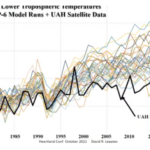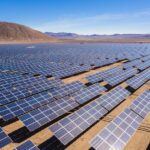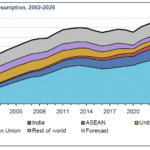
Het Chinese duo Yujie Liu and Fulu Tao van het Institute of Geographical Sciences and Natural Resources Research van de Chinese Academy of Sciences hebben een baanbrekende studie gepubliceerd in het Journal of Applied Meteorology and Climatology 2012. Als de Chinezen hier echt van overtuigd raken is het hek van de dam…
Probabilistic change of wheat productivity and water use in China for global mean temperature changes of 1, 2, and 3°C
Fragment uit abstract: Elevated CO2 concentration generally compensates for the negative effects of warming temperatures on production. Moreover, positive effects of elevated CO2 concentration on grain yield increase with warming temperatures. The findings could be critical for climate change-driven agricultural production that ensures global food security.
Lees het hele abstract ….
Impacts of climate change on agriculture are a major concern worldwide. However, uncertainties of climate models and emission scenarios may hamper efforts to adapt to climate change. In this paper, a probabilistic approach is used to estimate the uncertainties and simulate impacts of global warming on wheat production and water use in the main wheat cultivation regions of China, with a global mean temperature (GMT) increase scale relative to 1961–1990 values. From output of 20 climate scenarios of the Intergovernmental Panel on Climate Change Data Distribution Centre, median values of projected changes in monthly mean climate variables for representative stations are adapted. These are used to drive the CERES (Crop Environment Resource Synthesis) – Wheat model to simulate wheat production and water use under baseline and global warming scenarios, with and without consideration of CO2 fertilization effects. Results show that because of temperature increase, projected wheat growing periods for GMT changes of 1, 2 and 3°C would shorten with an averaged median values 3.94%, 6.90%, and 9.67%, respectively. There is a high probability of decreasing (increasing) changes in yield and water use efficiency under higher temperature scenarios without (with) consideration of CO2 fertilization effects. Elevated CO2 concentration generally compensates for the negative effects of warming temperatures on production. Moreover, positive effects of elevated CO2 concentration on grain yield increase with warming temperatures. The findings could be critical for climate change-driven agricultural production that ensures global food security.
Say no more!






Mooie blog, Hajo.
Nog een linkje….
http://www.co2science.org/data/plant_growth/dry/d…
En dan op de verschillende letters klikken.
En ik vond nog dit review artikel klik hier
En dat ga ik vanavond eens doorlezen. ;-)
Deze wetenschappelijke studie is eigenlijk een open deur. Een volgende Chinese studie zal waarschijnlijk concluderen dat hogere globale temperaturen de biodiversiteit doen verhogen (we weten al dat het aantal soorten toeneemt van pool naar evenaar). Nog zo een: toenemende zeetemperatuur zal het gebied van tropische koraalgroei uitbreiden. En dan deze: atollen groeien dankzij stijgende zeespiegel, dalende zeespiegel vinden ze niet leuk. Of de media deze positieve geluiden willen rapporteren is hoogst onwaarschijnlijk.
Dit is politiek gezien waarschijnlijk inderdaad van enorm belang!
In China zijn voor zover ik weet de wetenschappers niet geheel vrij alles te beweren wat ze willen. Er is een sterke mate van beheersing (door de staat) van alle debatten die raken aan beleidsontwikkeling. Wanneer een paar vooraanstaande figuren uit de Chinese Academy of Sciences dit in een internationaal tijdschrift publiceren, dan moet dit betekenen dat deze visie op zijn minst ernstig wordt overwogen in leidende kringen van de Chinese regering.
Als dit ingang vindt, en daarvoor hoeft niks bijzonders te gebeuren want het is gewoon voortzetting van "Business As Usual", dan kan ieder "klimaatbeleid" van Europa en Amerika verder worden vergeten en volstrekt de prullebak in denk ik! Het zou aardig zijn als Hajo een kopie van het bedoelde gepubliceerde artikel te pakken zou krijgen en dit ergens op deze site ter inzage zou neerzetten.